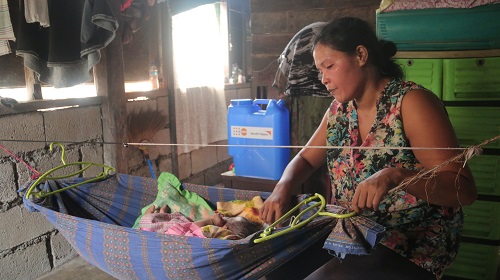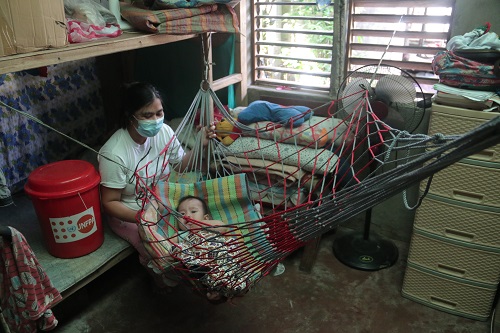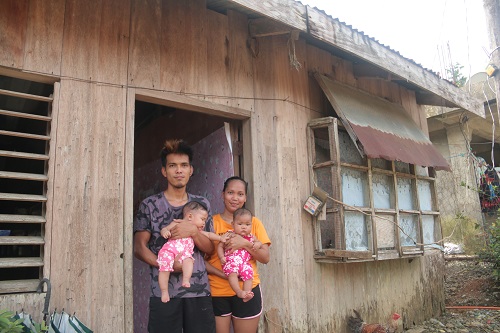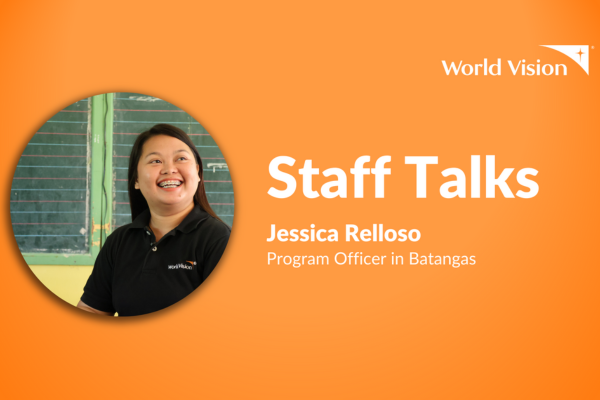Supporting health sector with lifeline for pregnant and lactating women
For some women, one of their most anticipated phases in life is motherhood, especially the pregnancy and lactating stages. But in Catanduanes, a province in the Philippines, many mothers were robbed of this experience after a super typhoon hit the island and left them vulnerable.

In November last year, Maria Hannah, 21 years old, was seven months pregnant when super typhoon Goni hit Catanduanes, an island province in the easternmost part of the country.
The young mother recalled that she and her husband evacuated to their elevated town center. Despite being made of cement and steel roofing, the establishment was almost damaged because of the super typhoon’s strength. The covered court, which was just beside the center, was totally blown away.
“It was a terrifying experience. I held my belly the entire time and prayed hard for our safety,” shared Maria. “When the storm passed, and all of us in the evacuation center were unharmed, I knew that my prayer was answered.”
When Maria and her husband went outside the town center, everything was flooded, including their house. It was then that she realized that the disaster wasn’t over yet.
The strongest storm
Typhoon Goni was considered one of the strongest typhoons ever recorded worldwide during 2020, a year that wasn’t short of disasters. It peaked to a maximum of 315 km/h before it made landfall in the island province. It affected over 2 million persons in 7 regions in the country.
Goni also affected the access to maternal health care – a lifeline among pregnant women and lactating mothers.
Health infrastructure had significant damage. The Virac Municipal Health Office wasn’t spared, especially its birthing room. It was unroofed, and the ceiling collapsed. Some electrical wirings were also not spared. The rain drenched equipment and medical supplies. The other village health centers in 27 barangays in Virac were also impaired.
Doctor Catalino Pedez from the Bato Maternity and Children’s Hospital shared how the Goni affected their service delivery. “The super typhoon damaged our hospital, but it was the electrical blackout that affected our hospital operation. Most of our equipment relied on electricity. We have a generator set, but it wasn’t enough to power the entire hospital,” the Chief Doctor said.

In far-flung areas, landslide hampered roads for days which stopped pregnant women and lactating mothers from accessing needed medicinal and hygiene supplies. Lenette, a mother of five, shared that she wasn’t able to go to the town proper to buy soap and other cleaning materials because of the landslides. “It was important for me to keep my family, especially my infant child, clean for their protection during this pandemic,” shared the mother.

Dominique, a mother of twin babies, received a maternal kit from UNFPA and World Vision. She shared that it is important to maintain a clean body especially for mothers who are taking care of their infants.
Maternal health projects as life-saving aid
After the onslaught of the super typhoon, UNFPA, the United Nations Population Fund, World Vision Philippines and delivered relief aid to address the gaps caused by Goni on maternal health care. The project is supported by the Australian Government.
The partnership provided maternity kits for lactating mothers, and dignity kits for pregnant and women with disabilities.
The partnership also provided water containers or jerry cans.
The Virac Municipal Health Center also received a tent that now serves as an emergency birthing facility, including birthing facilities such as a delivery bed. The Bato Maternal and Children Hospital also received a tent which is being used as a Woman-friendly space where pregnant women and lactating mothers receive maternal education and services.
Mothers in far-flung areas also received battery-powered radio sets for information updating and awareness.
For Dr. Elva Joson M.D. from the Virac Municipal Health Center, she shared that the health relief aid they received was more than just material support. “When we received the aid from UNFPA and World Vision, our morale was boosted. We were already coping with the impact of the COVID-19 pandemic, and it was made worse by the super typhoon. We realized that there are generous individuals who are ready to come to our aid,” Dr. Joson shared.








